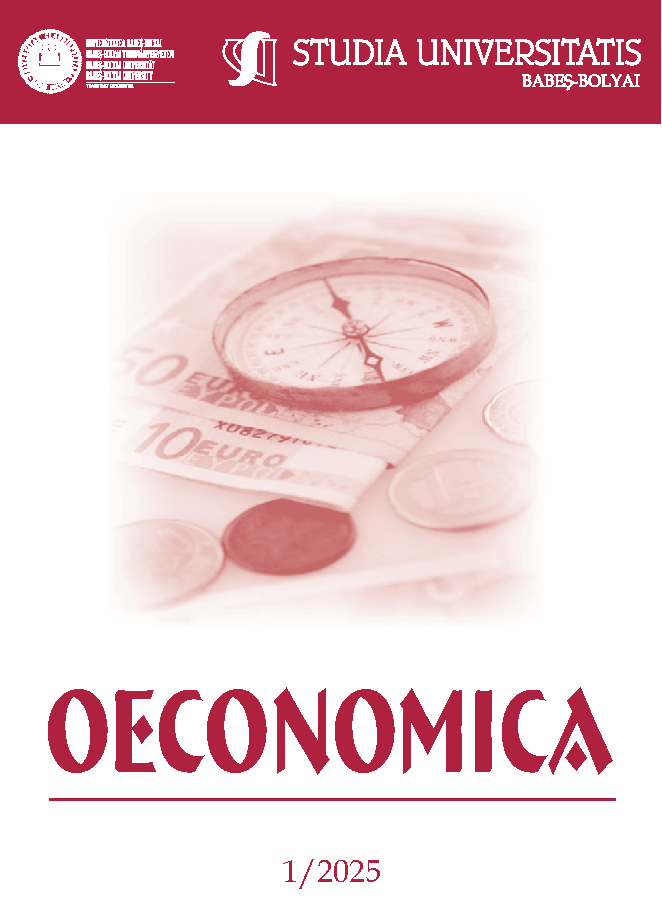THE SECOND AXELROD TOURNAMENT: A MONTE CARLO EXPLORATION OF UNCERTAINTY ABOUT THE NUMBER OF ROUNDS IN ITERATED PRISONER’S DILEMMA
DOI:
https://doi.org/10.2478/subboec-2025-0004Keywords:
Prisoner’s Dilemma, repeated games, Axelrod second Tournament, agent-based modeling, finite and infinite gamesAbstract
Strategic decision-making in multi-agent interactions inside the Iterated Prisoner's Dilemma (IPD) is investigated in this work using Monte Carlo simulations. Building on Axelrod's work, we present a second-generation tournament with stochastic components, including unpredictable game lengths, to evaluate strategy adaptability and resilience. We analyze how uncertainty influences strategic performance by using a comparison between instances with fixed and uncertain times. We identify, using a descriptive approach, methods demonstrating important behavioral differences between deterministic and uncertain settings. The results provide understanding of adaptive learning, response dynamics, and strategic flexibility, so helping to build strong collaborative strategies for artificial intelligence and decision-making systems. Our results highlight the limitations of exclusively deterministic methods and suggest the necessity for adaptive approaches to improve long-term cooperative success.
JEL Classification: C70; C73; C79
References
Akin, E. (2016). The iterated Prisoner’s Dilemma: good strategies and their dynamics. In A. Idris (Ed.), Ergodic Theory (pp. 77-107). De Gruyter. https://doi.org/doi:10.1515/9783110461510-004
Axelrod, R. (1984). The Evolution of Cooperation. Basic Books.
Axelrod, R., & Hamilton, W. D. (1981). The evolution of cooperation. Science, 211(4489), 1390-1396.
Ben-Porath, E. (1990). The Complexity of Computing a Best Response Automaton in Repeated Games with Mixed Strategies. Games and Economic Behavior, 2, 1–12. https://doi.org/https://doi.org/10.1016/0899-8256(90)90010-R
Chiong, R., & Jankovic, L. (2008). Learning game strategy design through iterated Prisoner's Dilemma. Int. J. Comput. Appl. Technol., 32, 216-223.
Chong, S. Y., Humble, J., Kendall, G., Li, J., & Yao, X. (2007). Iterated Prisoner's Dilemma and Evolutionary Game Theory. In The Iterated Prisoners' Dilemma (Vol. Volume 4, pp. 23-62). WORLD SCIENTIFIC.
Leonardos Stefanos, P. G. (2012). Exploration-Exploitation Tradeoffs in Multi-Agent Systems: Catastrophe theory meets game theory. Journal of Artificial Intelligence Research, 304, 103653. https://doi.org/https://doi.org/10.1016/j.artint.2021.103653
Leyton-Brown, K., & Shoham, Y. (2008). Essentials of Game Theory: A Concise Multidisciplinary Introduction (Vol. 2). Morgan and Claypool Publishers.
Meng Chen-Lu, P. R. (2001). The Iterated Prisoner's Dilemma: early experiences with Learning Classifier System-based simple agents. Decision Support Systems, 31(4), 379-403. https://doi.org/https://doi.org/10.1016/S0167-9236(00)00137-8
Myerson, R. B. (1991). Game Theory: Analysis of Conflict (H. U. Press, Ed.). Harvard University Press.
Nachbar, J. (2005). Beliefs and Learning in Repeated Games. Econometrica, 73(2), 459-480. http://www.jstor.org/stable/3598794
Nash, J. (1950). Equilibrium Points in n-Person Games. Proceedings of the National Academy of Sciences, 36, 48–49.
Project, T. A. (2015). Axelrod: second tournament. https://axelrod.readthedocs.io/en/fix-documentation/reference/overview_of_strategies.html#axelrod-s-second-tournament
Press, W. H. & Dyson, F. J. (2012) Iterated Prisoners Dilemma contains strategies that dominate any evolutionary opponent. Proc. Natl. Acad Sci. USA 109, 10409–10413.
Rothe, J. (2010). Economics and Computation - An Introduction to Algorithmic Game and Fair Division Theory, Computational Sociial Choice,and Fair Division. Springer
Thomopoulos, N. (2013). Essentials of Monte Carlo Simulation: Statistical Methods for Building Simulation Models. Springer.
Tutzauer, F. (2007). A matrix approach to generalizing Axelrod-type tournaments. Journal of Mathematical Sociology, 31(3), 249-266.
Tychonov, A. (1935). Ein Fixpunktsatz. Mathematische Annalen, 111, 767–776.
Vincent, F. M., & Fryer, D. E. A. (2021). Top score in Axelrod Tournament. arXiv preprint arXiv:2104.03347.
Zhou, Y. H., Yu, J., & Wang, L. (2011). A new proof of existence of equilibria in infinite normal form games. Applied Mathematics Letters, 24(3), 253-256. https://doi.org/https://doi.org/10.1016/j.aml.2010.09.014.
Downloads
Published
How to Cite
Issue
Section
License
Copyright (c) 2025 Studia Universitatis Babeș-Bolyai Oeconomica

This work is licensed under a Creative Commons Attribution-NonCommercial-NoDerivatives 4.0 International License.



